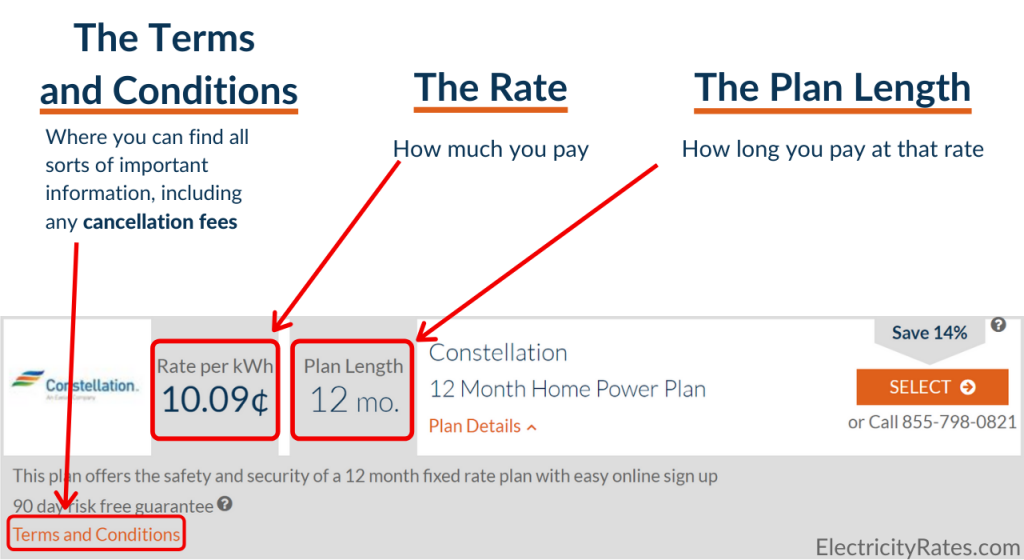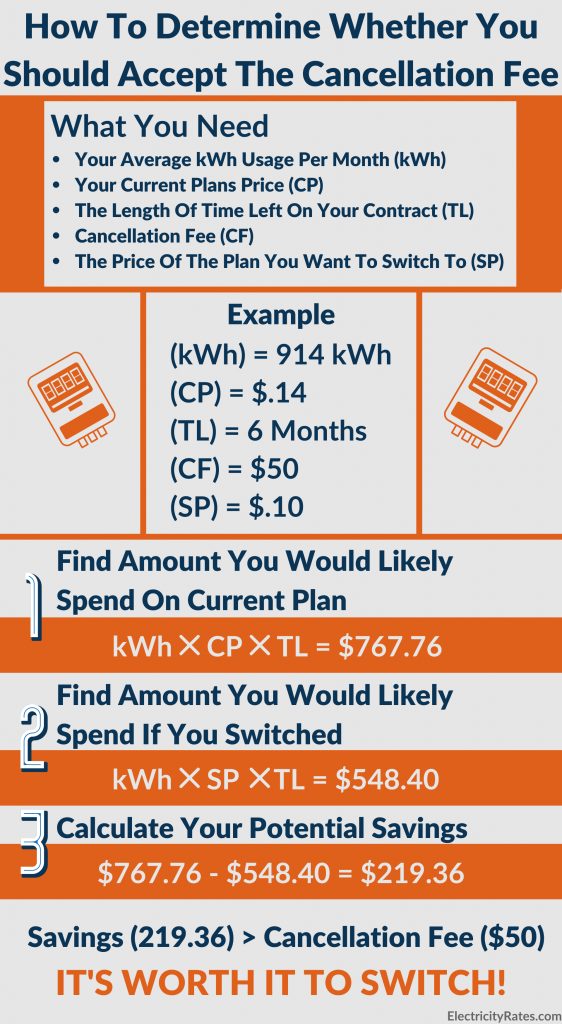The browser you are using is not supported. Please consider using a modern browser.

Reading Your Electricity Contract
It’s critical to understand your electricity contract and know what you are signing up for. This guide ensures you do this by covering their most important aspects.
Video: How to Compare Terms of an Electricity Contract
Using Our Free Rate Comparison Tool
ElectricityRates.com’s Compare and Switch Tool presents all the important contract info in an easy-to-readformat.
Like this:

When In Doubt, Check The Terms And Conditions
The terms and conditions are the rules that both you and the utility must abide by. Of course, many people joke about not reading the terms and conditions, but it is important that you do. It is only a few minutes out of your day, and it will help you truly understand the terms of your agreement.
We lay a lot of the information out for you in this guide and through our platform, but if there is anything that you are wondering or unsure about, this is the document to check.
You can find the terms and conditions by clicking on the “Plan Details” button.

What Is Your Electricity Rate?
Your rate is the first thing that comes to your mind when you think about switching, so we ensure your rates are the first thing that you see so you can compare prices.

This is the time period of your contract. It can vary widely, with some plans as short as three months and others that can go out to five years.
Fixed vs. Variable Electricity Rate Plans
When you are deciding on a plan, you want to determine if the plan is under a fixed or variable rate.
A fixed-rate is locked in for the plan’s length. In the example above, that means your rate won’t change from that 9.99 cents per kWh.
A variable-rate can change from the rate advertised. If the example above was a variable rate, it would mean they could charge you more or less than that 9.99 cents per kWh depending on the month.
You can find out whether a plan is fixed or variable by looking at the terms and conditions.
What is the Ideal Plan Length?
There isn’t one. It all depends on your situation.
For example, shorter electric plans are often more expensive, but allow you to get out of the contract earlier (see cancellation fees below).
A longer contract will most likely be cheaper, but you are locked in at that rate. If you sign up for a three-year plan, and electricity rates go down the next year, you are stuck paying a higher rate. However, the opposite is true as well. If prices go up, you save money because you are locked in at that rate.
Can You Cancel Your Electricity Contract Before It Ends?
Yes, but you may not want to.
You must consider the cancellation fee.
Cancellation Fee
If you are already on a fixed-rate plan, you likely have a cancellation fee that will be charged if you switch or try to get out of your electricity contract before its scheduled end date. This can range from $0-$250.
You can often find the cancellation fee in the “Plan Details” section.

If it is not listed there, it will most likely be in the Terms and Conditions under a subheading of “Early Termination Fee” or “Cancellation Fee.” Many suppliers will put their cancellation fee’s right at the top of the terms and conditions to make it easier to find.
How Do I Determine Whether I Should Accept The Cancellation Fee?
Debating on if it is worth it to accept the cancellation fee? Use this formula to help you determine which will save you more money.
What we need to know:
- Your Average kWh Usage Per Month: You can get this number by finding the average of your last few billing statements. Or you can just use your last billing statement. If you are going to take this route, you will want to think about whether these were high usage months and if that high usage will continue in the future.
- Your Current Plans Price
- The Length of Time Left On Your Contract
- Cancellation Fee
- The Price of The Plan You Want To Switch To
1. Find the amount of money you will likely spend on your current plan.
Then, follow these steps:
How much you will spend on your current rate = Average kWh per month * Current Price * Months Left On Contract
2. Find the amount of money you would spend if you switched
How much you would spend if you switched = Average kWh per month * Price On New Contract * Months left on Contract
3. Subtract the expense if you stay with your current plan from how much you would spend if you switched.
Savings = How much you will spend on your current rate – how much you would spend if you switched
If your savings are greater than your cancellation fee, it is worth it for you to switch.
Here is an example with the actual numbers so you can see how the math works out:

What Happens At The End Of Your Electricity Contract?
Again, this is detailed in the terms and conditions.
Most likely, if you were on a fixed-rate contract, you will go directly into a variable rate contract. The supplier may or may not give you notice of this, so it is important to understand when your contract ends so you can take action.
You have three options:
- Do nothing: And be switched to a variable rate plan where your rates will change from month-to-month
- Renegotiate another fixed-plan with your current supplier
- Switch to another electricity supplier’s plan
It is best to find another fixed-rate plan. Variable electricity rates can open you up to uncertain price changes and you will often end up paying more.
When Is The Best Time To Renew Electricity Contracts?
Ideally, you want to renew your contract when you are not currently under contract to avoid a cancellation fee.
Outside of that, you want to start comparing plans about 2 months before your current plan ends.
This way, you can survey your options before you choose. It will also give you time to switch over to a new plan before your fixed rate ends. Most of the time, when you switch, it takes one to two billing cycles for your new plan to take over.
That’s All The Important Info!
Now you got all the important information that you need to make sure you understand your contract and get the best deal possible. Be sure to enter your ZIP Code on ElectricityRates.com to see how much you can save by switching electricity providers today!
